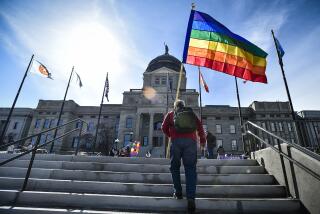Mass. Legislators Divided on Gay Marriage Ruling
- Share via
BOSTON — With stacks of major legislation pending -- matters as urgent as a $102-million supplementary budget bill, a salary authorization for public employees serving in the military in Iraq and a ban on workplace smoking -- Massachusetts legislators had expected a chaotic day Wednesday, the close of the 2003 session.
Then the Supreme Judicial Court compounded the confusion by making Massachusetts the first state to legalize same-sex marriage -- and telling lawmakers that they had 180 days to figure out what to do about it. The result was a frantic rush to digest a complex decision whose mandate took most by surprise.
On Beacon Hill, said Senate press aide Ann C. Dufresne, “the air was already highly charged. The ... decision absolutely electrified the atmosphere up here.”
In corridors and offices around the gold-domed statehouse across from Boston Common, legislators’ reactions to Goodridge vs. Massachusetts Board of Health -- the ruling that said the state’s Constitution guarantees same-sex couples the right to marry -- split into distinct blocs.
“There is mine, filled with people who believe we should applaud this decision and spend the next 179 days facilitating its implementation,” said Sen. Cheryl A. Jacques, a Democrat who is one of two openly gay state senators here.
A middle segment, the largest group, was unsure Wednesday how to respond to the groundbreaking ruling by the state’s highest court.
“One hundred eighty days to do what?” asked Dufresne, whose Democratic boss, Senate President Robert E. Travaglini, has long supported extending domestic benefits to gay and lesbian couples, but stopped short of supporting same-sex marriage.
One option for this faction is to seek an official advisory from the justices who rendered the decision Tuesday. Another is to urge swift passage of a civil-union bill that has been pending for months on Beacon Hill.
But Democratic Sen. Jarrett T. Barrios, one of the sponsors of that bill, called lawmakers who support such action “disingenuous.” Barrios, who is gay, said: “At the end of the day, this decision stands. There is nothing for this Legislature to do. The court has made that clear.”
After spending most of Wednesday poring over the court’s ruling, Senate counsel David Sullivan concurred.
“There are many unanswered questions, but our reading is that the court’s declaration of the principle of law in this case will take effect 180 days from now, even if the Legislature does not take action,” Sullivan said. “I am not sure how we could intervene, short of altering the Constitution.”
By far the most vocal faction of legislators rallied Wednesday behind Republican Gov. Mitt Romney, a foe of same-sex marriage. Romney took to the national airwaves Wednesday, appearing on the “Today” show and “Good Morning, America” to call for an amendment to the state’s Constitution limiting marriage to a union between a man and a woman.
“The governor believes we should provide basic civil rights and appropriate benefits to gay and lesbian couples,” said his press secretary, Shawn Feddeman. “He does not support gay marriage.”
But in drawing up a document that later would serve as the model for the U.S. Constitution, the framers of the Massachusetts system of government guarded against easy or capricious changes to the state’s charter. Altering the Constitution here is a cumbersome process that requires at least three years.
To act on an amendment, legislators must call a constitutional convention -- known on Beacon Hill as a “con-con.” An amendment to limit marriage to heterosexual unions could not be voted on before 2006.
In the meantime, Jacques said, “hundreds, if not thousands of couples will have exercised their legal right to marry. Do you think Massachusetts taxpayers will stand by and pay for what amounts to forced government divorce?”
Stanley E. Nyberg, who oversees the registry of vital records and statistics for the state Department of Public Health, issued a pair of memos Wednesday warning city and town clerks to “maintain the status quo” in issuing marriage licenses for the next six months.
“Issuing a marriage license to same-sex couples within the next 180 days would violate the Supreme Judicial Court’s ruling,” Nyberg wrote.
Some town clerks, however, said they might issue marriage licenses to lesbian and gay couples as early as next week.
Barrios and Jacques both are in committed relationships, but both said they had been too busy in the last 24 hours to propose to their partners -- or to be proposed to. Jacques is preparing to leave office in January to head the Washington-based Human Rights Campaign, a gay and lesbian advocacy group.
“The thing to keep in mind,” she said, “is that on Nov. 18, 2003, absolutely nothing changed for the vast majority of Massachusetts residents. But for a small minority of Massachusetts residents -- gay and lesbian residents -- Nov. 18 was the best day of their lives.”
More to Read
Get the L.A. Times Politics newsletter
Deeply reported insights into legislation, politics and policy from Sacramento, Washington and beyond. In your inbox twice per week.
You may occasionally receive promotional content from the Los Angeles Times.






